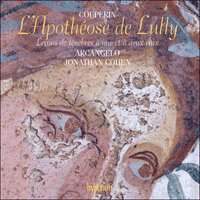Texte paru dans: / Appeared in: |
|
|
Outil de traduction ~ (Très approximatif) |
|
|
Reviewer: Barry
Brenesal
Though I’ve enjoyed listening
to several recordings that featured Jonathan Cohen and Arcangelo, I’ve only
reviewed one, where they accompanied Christopher Purvis in a program of
Handel’s arias for bass (Hyperion 67842). They were in fact the one constant
attraction on an otherwise uneven release: alert, accurate, sensitive to
both style and expressivity. Much the same can be said about this new album. Theirs is what might be called a middle of the road performance of L’Apothéose de Lully, eschewing both the lightning brilliance of Beyer and Gli Incogniti (Harmonia Mundi 902193; Fanfare 38:3), which shades over occasionally into eccentricity, and the leisurely charms of Les Ombres (Ambronay 301) that too often loses momentum. “Rumeur Souteraine” is taken at roughly 144 bpm—again, striking a reasonable balance between Beyer’s scrambling 166 and Les Ombres’s dull 135. The performers are all expert, not merely in performance, but in an understanding of the music’s flexible pulse and an approach to ornamentation that feels wholly natural. Arcangelo’s roll-call of just five performers promotes textural clarity. The title of each movement is read by baritone Stéphane Degout, with the kind of luxurious enunciation that makes me want to get out my DVD of Les enfants du paradis and listen to Jean-Louis Barrault emote. The pair of vocal soloists in the Trois Leçons is well chosen. Soprano Katherine Watson was one of the best things on a DVD of Monteverdi’s L’Incoronazione di Poppea (Virgin Classics 07095 191; Fanfare 37:1) that suffered from assassination-by-stage-director a few years back. Hers is a beautifully equalized voice throughout its extensive range. She phrases in a manner that serves the text while remaining wholly musical, shading through dynamics and tonal coloration. Anna Dennis’s mezzo-shaded soprano makes for a good contrast with Watson’s more gleaming one. At her best in a recent recording of Rameau’s Anacréon (Signum 402; Fanfare 39:4), Dennis possesses excellent focus, a rich tone in her mid-range, and a sense of refined phrasing. Her negatives—sketchiness in more agile passagework, softened consonants in her upper range—aren’t issues in this music. Her majestically tossed out “Peccatem” in the Second Lesson’s Heth is world’s away from Elisabeth Watts’s tonally suspect version under David Bates’s direction (Harmonia Mundi 807659; Fanfare 40:3). Cohen’s pacing is excellent, and he shapes the music in a manner that shows appreciation for Couperin’s lyrical line. For sheer splendor of voice and stylishness of treatment, this version can’t be bettered. It’s only equaled by a venerable performance under William Christie’s baton (Erato 0630-17067-2; Fanfare 21:1), featuring Patricia Petibon and Sophie Daneman. Petibon and Daneman are ethereal, but to hear Watson and Dennis intone “Mem” in the Third Lesson is to invoke a somewhat earthier reflection of paradise. However, I’m less sanguinary about the recorded sound. The Trois Leçons exhibit good presence and balance, but L’Apothéose is both moderately recessed from the microphone and slightly too over-reverberant. The reasons for this treatment must remain unknown, since Arcangelo’s pair of violinists, Sophie Gent and Bojan Čičíc, are among those that employ little or no vibrato, yet suffer no loss of tonal quality. This leaves me at a loss to understand why the engineering is permitted to drain their attractive sound of its overtones in, for example, the “Descente d’Apollon” and especially “Plaintes des Mêmes.” In this respect, the immediacy of the version that features Beyer and Gli Incogniti (Harmonia Mundi 902193; Fanfare 38:3) is completely missing.
On balance,
this album would be worth it alone for the Trois Leçons, which immediately
takes a position among my favorites. L’Apothéose de Lully is more
problematic, but I don’t find the sound off-putting enough to recommend
against it. Performance-wise, it is exceptional, but the sound wouldn’t be
my first or even second choice. | |
|
Support us financially by purchasing this disc from eiher one of these suppliers. Un achat via l'un ou l'autre des fournisseurs proposés contribue à défrayer les coûts d'exploitation de ce site. |
|
|
|
|
|
Cliquez l'un ou l'autre
bouton pour découvrir bien d'autres critiques de CD |
|




